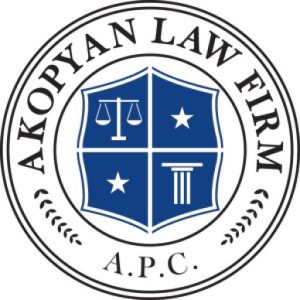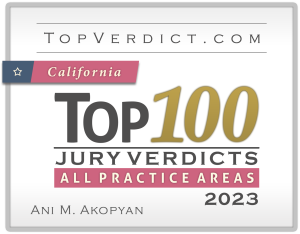Canyon Lake Employment Attorneys
The trial attorneys of the Akopyan Law Firm A.P.C. stand ready to fight for the rights of the residents of Canyon Lake, regardless of whether they are employees or employers. If your cause is just and involves employment law, give us a call to see how we can help.
 Canyon Lake, California
Canyon Lake, California
Canyon Lake is city located in Riverside County. Canyon Lake covers only five square miles but is home to roughly 11,000 residents. Canyon Lake lies within zip code 92587. Canyon Lake began as a master-planned community developed by Corona Land Company in 1968. The City of Canyon Lake was incorporated on December 1, 1990. The city of Canyon Lake is named after the reservoir it is built around. Initially, the reservoir was known as Railroad Canyon Reservoir, or Railroad Canyon Lake, but now the reservoir and the community are referred to by the shortened form, Canyon Lake.
The Best Employment Lawyer in Canyon Lake
Canyon Lake, as a thriving community, presents its residents with a multitude of choices when it comes to legal representation. Performing an online search for “employment lawyer Canyon Lake” or “wrongful termination attorney Canyon Lake” is likely to yield a plethora of paid advertisements from employment lawyers based in various locations. The challenge lies in identifying the right attorney possessing the necessary skill and experience to handle employment trials and litigation, particularly when the primary source of information is an online advertisement.
At the Akopyan Law Firm, A.P.C., each of our attorneys boasts nearly two decades of experience. They have consistently demonstrated a strong track record of success in representing both employees and employers. Our firm’s core principle revolves around prioritizing quality over quantity. We are dedicated to providing top-tier legal representation that is tailored to meet the unique needs of our clients.
With our offices located just minutes away from Canyon Lake, we are strategically positioned to offer legal representation of the highest caliber to the residents of this dynamic community. Our physical proximity ensures that we can promptly address your legal concerns and provide the personalized attention your case deserves.
The Akopyan Law Firm A.P.C. maintains offices in Los Angeles, Bakersfield, Oxnard, Temecula, Rancho Cucamonga, Costa Mesa, Culver City, and San Diego, making us readily accessible to clients from various areas. Our employment lawyers are well-prepared to offer world-class services and exceptional representation, ensuring that the legal needs of Canyon Lake residents are met with professionalism and excellence. When you require seasoned professionals who are dedicated to your case’s success, we are here to serve you.
We Can Help Canyon Lake Residents With:
Featured Article:
Unlawful Termination After Requesting Time Off to Care for a Seriously Ill Family Member in California
📌 Key Takeaways Close timing can matter. When an employer disciplines, reduces hours, changes schedules, or terminates an employee shortly after a request for job-protected family-care leave, the sequence of events may be relevant in a retaliation or interference analysis. Compare “before” and “after.” A shift from stable performance feedback to sudden criticism, write-ups, or schedule changes after a leave request can be an important pattern to document. Employer reasons should be evaluated against the record. “Restructuring,” “performance issues,” or “minor mistakes” may be legitimate in some situations, but a lawyer will often assess whether those explanations are consistent, documented, and applied evenly. More than one law can apply. Depending on eligibility and the facts, job-protected family and medical leave protections and anti-retaliation rules may overlap. Details and documents help. In an initial consultation, an employment lawyer will typically focus on the timeline, written communications, schedule records, and supervisor statements to assess potential claims. ~ ~ ~ ~ ~ ~ ~ ~ ~ ~ ~ ~ ~ ~ ~ ~ ~ ~ When an employee in California loses a job soon after requesting time off to care for a seriously ill family member, that timing may raise questions about whether the employer acted unlawfully. In many cases, the key issues are what was requested, whether the request involved job-protected leave, what changed afterward, and how the employer explains the termination or other adverse actions. When A Request for Family-Care Leave is Followed by Job Loss Consider two examples: Example 1: An employee in a warehouse role requests several days off to help a spouse through serious surgery. After the request, the employee’s schedule changes, disciplinary write-ups begin, and the employer terminates the employee. Example 2: A grocery employee requests time off to care for a seriously ill parent. Soon afterward, a supervisor starts focusing on minor issues that previously drew no attention, and the employee is told the position is no longer available. These examples do not prove wrongdoing by themselves. But when termination (or other significant employment actions) closely follows a request for job-protected family medical leave, the timing and pattern can become relevant facts in evaluating possible retaliation, interference with protected leave, or other unlawful conduct. Employees In Hourly and Schedule-Dependent Jobs May Feel the Impact Most Immediately A sudden termination can be especially disruptive for employees in hourly, schedule-dependent, or frontline roles (for example, warehouse, retail, delivery, restaurant, manufacturing, and similar jobs). Job loss in these circumstances often creates: Immediate loss of income needed for housing, food, transportation, and basic expenses. Added strain when the same paycheck supports a seriously ill family member’s care. Limited ability to absorb missed paychecks, particularly for employees living paycheck to paycheck. It is also common for employees to feel unsure how to describe what happened or to assume the situation is “just unfair.” A clearer approach is to focus on the sequence of events, the employer’s actions, and what was said or documented. Red Flags to Document Before and After... Read more









Millions of Dollars Recovered For Our Clients
Check Out Our Case Results



